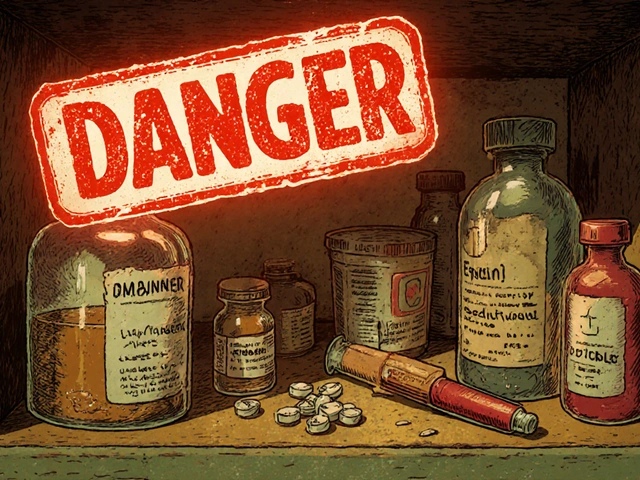The importance of self-care during sickness
Understanding Self-Care During Sickness: The Essential First Steps
If there's one thing I've learned in my years, it's that Hudson Beauregard (or just Hudson for the sake of brevity) is not indestructible. Nope. I am a human just like anyone else, susceptible to common colds, flu, and the not-so-rare instances of overdoing the much-loved triple chocolate chip cookies. In times like these, when my body shouts a resounding "enough!", there's one thing I've found exceedingly important - self-care. And no, it's not about running a hot bath and indulging in spa-like luxury. Though, I must say, Lillian sure could make that sound enticing. It's more about a holistic approach involving physical, mental, and emotional wellness during sickness, a trinity that's often overlooked.
The Physical Side of Self-Care and its Importance
Now, let me tell you the case of our prickly little friend, Theodore - no, not the chipmunk from Alvin and the gang, but our dear hedgehog. Now, Theodore isn't a fan of self-care. You overfeed him, and he'll munch away without a care in the world. Overeating, reduced exercise, the occasional prickly tantrum - you name it, this little rascal has done it. But, what we can learn from Theodore is, it can take a toll on their little bodies. Excessive eating can make him fat and lethargic, leading to distinct health issues.
Strangely enough, people are not very different. Our bodies demand nurturing and respect, and during times of sickness, this need amplifies. From ensuring a balanced diet to staying adequately hydrated, the physical side of self-care carries formidable weight. It helps speed up recovery, lessens discomfort, and quite importantly, shields you from landing into another sticky health mess.
Mental Self-Care: Reflect, Relax, and Recuperate
Lillian always says, "Hudson, your most potent power lies upstairs." Puzzled, I’d pat my head, only to get a humorous shake of her head in return. Jokes apart, caring for your mental health during sickness can play a critical role in your overall well-being. Illness can bring an influx of negative feelings like frustration, anxiety, and sadness. It's crucial to acknowledge these feelings and not suppress them. After all, it's perfectly okay to feel upset. You're human, remember?
Incorporating techniques like meditation, mind-engaging activities, or simply talking feelings out can aid mental health substantially. Remember, you’re allowed to slow down, reduce expectations, and rest. Recuperating isn't just about nursing a physical ailment. As I found during one of my unfortunate bouts of flu, it's a comprehensive process, a combo pack, if you will.
The often Overlooked Emotional Side of Sick-Self-Care
Entering the "feelings" zone may sound daunting if you're anything like me. Would you believe, it took a nasty cold for me to reflect on the importance of emotional self-care? True story. Dealing with the discomfort and limitations of sickness, I found myself in an ocean of emotions ranging from self-pity to anger. Oh, the joy of being bedridden.
Recognizing and addressing these emotions turned out to be a healing remedy on its own. Here's a nugget of wisdom I garnered - Being gentle with oneself during sickness is half the battle won. Let's just say that emotional health plays an enormity in our recovery, much like a surprise plot twist in one of Theodore's sophisticated hedgehog dreams, well, if he has them!
Making Self-Care a Priority: A Lesson in disguise
Much like Theodore's proclivity for trouble, we humans have a knack for ignoring our well-being until the body sounds the alarm. Ironically, my path to self-care enlightenment unveiled during an illness phase. Quite the bargain deal, isn't it? Taking time to nurture your mind, body, and emotions, accepting help when needed, and understanding that recovery time varies were lessons I learned in the process and continue to apply in day-to-day life.
Seeking Help: It's Okay to Need Support
Last but certainly not least, acceptance. Whether it's seeking support from loved ones, embracing the fact that you're unwell, or handing the reigns over to a professional, knowing when and how to seek help is paramount. It's okay to acknowledge that you might need help. Remember, it's not a sign of weakness. In fact, Theodore here, in his prickly glory, isn't shy of seeking help either. The minute something bothers him, he makes sure Lillian and I are well aware, with loud apparent vrooming noises.
So, on that note, let's wrap this up. Self-care during sickness, much like our daily life, is about balance, understanding your body, and treating your mental and emotional self with kindness and respect. While the only constant in life is change, it's our duty to adapt and prioritize self-care as part of our routine. Think of it as a 'Get well soon' gift to yourself - one that you truly deserve.






19 Comments
Dean Briggs
August 2, 2023 at 01:04
When the body signals that it’s under siege, the most rational response is to treat the situation as a multifaceted negotiation between mind, body, and spirit; each facet demands its own brand of attention, lest the whole system collapse under the weight of neglect. The physical component is obvious: balanced nutrition, adequate hydration, and gentle movement act as the scaffolding that supports cellular repair, and without it the immune response stalls like a stalled engine. Yet the mental realm is equally critical, because anxiety and frustration release cortisol, which in turn can blunt the efficacy of white blood cells, a cascade that can prolong the convalescence period. Emotional self‑care, often dismissed as “just feelings,” actually functions as a regulatory thermostat, modulating stress responses and allowing the parasympathetic nervous system to dominate, which is the environment in which healing flourishes. A holistic approach therefore resembles a three‑legged stool; lose one leg and the whole structure wobbles, inviting further setbacks. Practical steps begin with setting realistic expectations-acknowledging that productivity will dip, and that is acceptable-followed by establishing a simple routine that interweaves short walks, breathing exercises, and moments of gratitude. Hydration can be made more appealing by infusing water with citrus or cucumber, thereby encouraging higher intake without feeling like a chore. Nutritionally, focusing on soups, stews, and smoothies provides both comfort and a dense array of micronutrients, which are the unsung heroes of immune function. For the mental side, even five minutes of guided meditation can lower heart rate and signal to the brain that safety has been restored. Emotionally, permitting oneself to experience disappointment or irritation without shame creates a sandbox for processing those feelings constructively. Social support, whether a text from a friend or a brief phone call, reinforces the sense that one is not battling the illness in isolation, a factor that research repeatedly shows improves outcomes. Moreover, recognizing the interdependence of these domains helps dismantle the myth that “toughing it out” is virtuous; instead, nurturing each aspect is an act of self‑respect. In practice, I’ve found that writing a short journal entry each evening, noting what I ate, how I felt, and what small victories I achieved, cements the habit of mindful self‑care. The cumulative effect of these modest practices compounds, turning a week of bedridden malaise into a period of gradual, empowered recovery. Ultimately, self‑care during sickness is not a luxury but a strategic deployment of resources aimed at restoring equilibrium as efficiently as possible. Therefore, the next time your throat feels raw or your head feels foggy, remember that the best prescription may well be a balanced trio of physical nourishment, mental tranquility, and emotional kindness.
Sadie Speid
August 2, 2023 at 02:10
Absolutely! A quick glass of warm honey‑lemon water can soothe the throat while providing a gentle antimicrobial boost. Pair that with a brief mindfulness pause, and you’ll notice a lift in both mood and immune function. Keep the momentum going-you’ve got this!
Sue Ross
August 2, 2023 at 03:17
Self‑care during illness really is about listening to the signals your body sends and responding with kindness rather than judgment. Prioritising rest doesn’t mean abandoning all activity; light stretching or a short walk to the kitchen for water can keep circulation moving without overexerting yourself. It’s also helpful to set realistic expectations for recovery, acknowledging that progress may be non‑linear and that setbacks are part of the process. By integrating physical, mental, and emotional strategies, you create a supportive environment that encourages healing rather than hinders it.
Rohinii Pradhan
August 2, 2023 at 04:24
While your advice is commendably balanced, it would be prudent to emphasize the importance of evidence‑based hydration-specifically, the intake of electrolytes alongside plain water to mitigate hyponatremia in prolonged febrile states. Additionally, the phrase “light stretching” benefits from clarification: activities should remain within a low‑intensity range, defined as less than 30 % of maximal heart rate, to avoid undue physiological stress. By incorporating these precise parameters, readers can implement self‑care measures with scientific rigor.
Anna-Lisa Hagley
August 2, 2023 at 05:30
One could argue that the entire self‑care narrative is a socially constructed veneer, an illusion designed to mask the inevitable decay of the flesh; after all, no amount of herbal tea or meditation can rewrite the genetic code that predetermines our mortality. Yet, paradoxically, this very illusion might serve as a coping mechanism, a philosophical scaffolding that grants temporary solace. In that sense, self‑care becomes a performative act-an aesthetic gesture rather than a truly efficacious intervention.
A Walton Smith
August 2, 2023 at 06:37
Hydration matters.
Theunis Oliphant
August 2, 2023 at 07:44
It is incumbent upon the discerning individual to recognize that neglecting one's corporeal vessel during convalescence constitutes a dereliction of personal responsibility, a transgression against the very principle of self‑preservation that undergirds civilized society.
India Digerida Para Occidente
August 2, 2023 at 08:50
While your moral framing is certainly lofty, it risks alienating those who simply lack the luxury of time or resources to engage in elaborate self‑care rituals; a more inclusive approach would acknowledge that even modest gestures-such as a brief pause for deep breathing-hold intrinsic value without demanding grandiose devotion.
Andrew Stevenson
August 2, 2023 at 09:57
From a functional recovery standpoint, implementing a multimodal self‑care protocol synergistically amplifies the innate immune cascade, thereby expediting the resolution of pathogenic load. Think of it as layering protective algorithms: nutritional optimization furnishes substrate for cellular repair, cognitive reframing attenuates psychosomatic stressors, and emotional validation sustains neurochemical equilibrium. By integrating these vectors, you essentially create a feedback loop that reinforces homeostasis and minimizes downtime.
Kate Taylor
August 2, 2023 at 11:04
Exactly-by treating each pillar as a component of an overall recovery system, you can monitor progress with measurable metrics like sleep quality, heart‑rate variability, and dietary macronutrient ratios. This data‑driven perspective not only validates the efficacy of self‑care but also empowers individuals to fine‑tune their routines for maximal benefit.
Hannah Mae
August 2, 2023 at 12:10
i guess all that self‑care stuff is kinda overrated, who needs a fancy routine when you can just binge Netflix and hope for the best?
Iván Cañas
August 2, 2023 at 13:17
While procrastinating with streaming marathons may offer short‑term distraction, empirical evidence suggests that structured rest combined with light activity yields superior immunological outcomes; thus, a balanced approach would marry entertainment with deliberate self‑care practices.
Jen Basay
August 2, 2023 at 14:24
Totally feel you! 😊 When I’m under the weather, I make a habit of sipping ginger tea and scrolling through calming playlists. It’s a small ritual that makes the day feel a bit brighter.
Hannah M
August 2, 2023 at 15:30
That’s a solid plan! 🌿 Adding a quick 5‑minute stretch between episodes can also keep circulation flowing, and the extra movement often reduces that sluggish feeling. Keep it up! 💪
Poorni Joth
August 2, 2023 at 16:37
Honestly, if you dont take care of yourself u r just asking for longer sickness, its not rocket science! Drink water, rest, and stop scrolling all day.
Yareli Gonzalez
August 2, 2023 at 17:44
Exactly, small consistent steps create a ripple effect that shortens the illness timeline-think of it as a gentle reminder that your body appreciates the care you give it.
Alisa Hayes
August 2, 2023 at 18:50
Self‑care isn’t a one‑size‑fits‑all prescription; it’s about tailoring actions to your personal preferences and constraints. Some people find comfort in journaling, while others prefer a quiet cup of broth. The key is to experiment and adopt what genuinely restores your energy levels without adding stress. Moreover, setting micro‑goals-like drinking an extra glass of water before bed-can build momentum without feeling overwhelming.
Mariana L Figueroa
August 2, 2023 at 19:57
Great tips! Try a quick gratitude list each morning-just three things-and watch your mood lift
mausumi priyadarshini
August 2, 2023 at 21:04
While the preceding suggestions are valuable, one must also consider the potential for over‑exertion; excessive zeal in self‑care routines can paradoxically tax the immune system, leading to diminished returns. Therefore, moderation remains paramount.